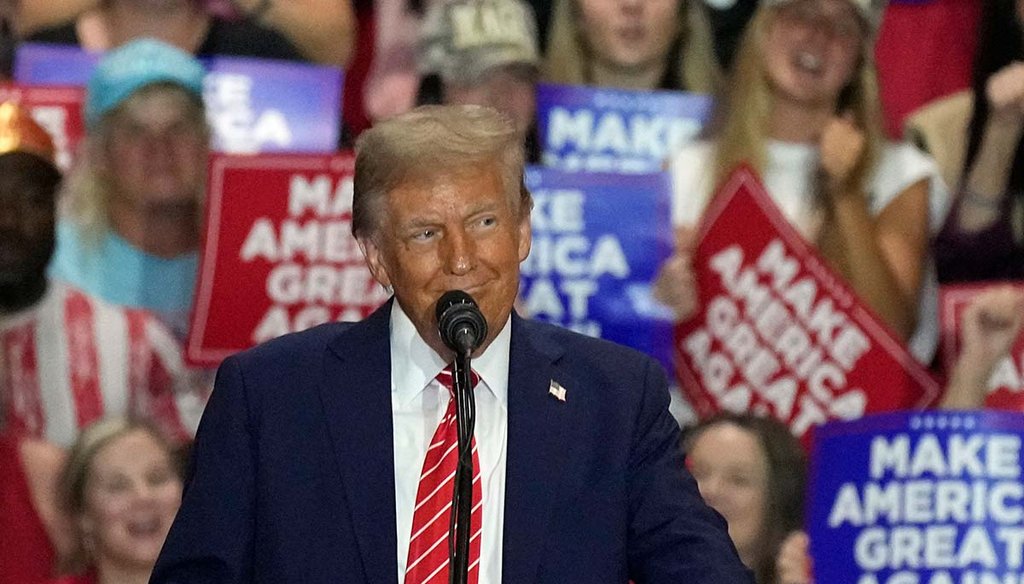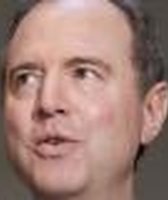Stand up for the facts!
Our only agenda is to publish the truth so you can be an informed participant in democracy.
We need your help.
I would like to contribute

Former President Donald Trump, the Republican presidential nominee, speaks Oct. 30, 2024, in Rocky Mount, N.C. (AP)
If Your Time is short
-
In October, former President Donald Trump frequently spoke about the “enemy from within” and was often vague about who the enemy is.
-
Trump told Fox News’ Howard Kurtz that Rep. Adam Schiff and Rep. Nancy Pelosi are “the enemy from within.”
-
Trump says that the “enemy from within” is more dangerous than foreign enemies such as China or Russia.
In the 2024 election’s final weeks, former President Donald Trump has repeatedly spotlighted what he calls "the enemy from within."
On Oct. 9, he told supporters in Scranton, Pennsylvania, that Vice President Kamala Harris is surrounded by "very smart, very vicious people" who are "the enemy from within."
On Oct. 13, he told Fox News’ Maria Bartiromo that U.S. Rep. Adam Schiff, D-Calif., is "the enemy from within" and, asked about the possibility of Election Day chaos, warned of "very bad people," "radical left lunatics" who should be handled if "necessary" by the National Guard or the military.
On Oct. 27, he told thousands of people gathered at Madison Square Garden in New York that the "enemy from within" is harming the country with "open-border policies (and) record-setting inflation.".
Experts say the "enemy from within" phrase echoes rhetoric by Sen. Joseph McCarthy, R-Wis., who notoriously led 1950s congressional investigations that aimed to root out the communism he claimed had infiltrated the federal government. And Trump’s October remarks don’t signal the first time he has talked about threats from within the U.S.
Sign up for PolitiFact texts
His repeated use of the vague phrase "enemy from within" has raised alarms among people who say Trump poses a danger to democracy. His warnings come as he has threatened to investigate media outlets and politicians and follow his repeated vow to his supporters that, "I am your retribution."
But what exactly does he mean when he says the "enemy from within"? We asked his campaign that question and got no answer. Presidential rhetoric experts say its cryptic phrasing is no accident.
"Trump’s use of the ‘enemy within’ language is intentionally vague, open-ended, and malleable," said Allison Prasch, an associate professor of rhetoric, politics and culture at the University of Wisconsin-Madison.
It "plants a seed" in the listeners’ minds that "there is something or someone that must be punished" for the current state of the economy, the immigration system, false claims about voter fraud, the U.S. political system or whatever he’s talking about, Prasch said.
"With this vague but explicit idea articulated, Trump underscores the ‘Us versus Them’ framing of the US electorate while also distancing himself from any actions taken by supporters against this ‘enemy within,’" she said. "It’s incredibly dangerous."
Although Trump has spoken freely in interviews and speeches about his perception that these "bad people" in the U.S. pose a greater threat to the nation than Russia or China, Trump’s running mate, Sen. JD Vance, R-Ohio, argued that Trump has never said this "enemy from within" includes Americans against whom he wants to invoke the military.
"He did not say that, Jake," Vance told CNN’s Jake Tapper on Oct. 27 on CNN’s "State of the Union," before asking Tapper to show him the quote. "He said that he was going to send the military after the American people?"
The heated exchange led us to break down just what Trump has said.
Trump has repeatedly singled out Rep. Nancy Pelosi, D-Calif., the former House speaker, and her fellow Schiff, also D-Calif., the lead prosecutor in the first Trump impeachment, as examples of the "enemy from within."
A week after he dropped Schiff’s name on Bartiromo’s Oct. 13 show, Trump was more specific: During an Oct. 20 interview with Fox News’ Howard Kurtz, Trump added Pelosi to the mix. "We have a lot of bad people," he said. "But when you look at Shifty Schiff and some of the others, yeah, they are, to me, the enemy from within. I think Nancy Pelosi is an enemy from within. She lied. She was supposed to protect the Capitol." (We have debunked falsehoods about Pelosi’s actions on Jan. 6, 2021.)
But often, Trump doesn’t say who he is referring to as the "enemy from within." His phrase can leave voters thinking that he is referring to the Biden-Harris administration, Vice President Kamala Harris or more broadly Democrats or anyone who disagrees with him.
He sometimes uses the phrase shortly after speaking about President Joe Biden or Harris, as he did Oct. 27 at Madison Square Garden.
"We’re running against something far bigger than Joe or Kamala and far more powerful than them, which is a massive, vicious, crooked, radical left machine that runs today’s Democrat Party. They’re just vessels. In fact, they’re perfect vessels because they’ll never give them a hard time. They’ll do whatever they want. I know many of them. It’s just this amorphous group of people. But they’re smart and they’re vicious. And we have to defeat them.
"And when I say ‘the enemy from within,’ the other side goes crazy, … ‘How can he say now they’ve done very bad things to this country?’ They are indeed the enemy from within. But this is who we’re fighting. These are the people who are doing such harm to our country with their open-border policies, record-setting inflation, green new scam and everything else that they’re doing, but we’re not going to let it happen any longer."
While speaking about about Harris on Oct. 9 in Scranton, Trump said she is "surrounded by very smart, very vicious people that have to be, you know, that are very radical left lunatics, OK, but they are smart, in some cases, genius. Look what they could do with elections. Look what they do. They’re smart, and we have to be very careful. I talk about the enemy from within. They’re the enemy from within."
Sometimes he mentions "enemy from within" in the context of voting, as he did Oct. 11 at a rally in Reno, Nevada: "We want a landslide that is too big to rig. Too big to rig. And again, early mail-in voting is underway and you have to get out there and do it and get everyone you know to vote because all, I mean, think of this, after everything that we’ve been through, we’ve been through a lot together, right? Hey, these are vicious, horrible people. I call it the enemy from within."
Trump often tells his supporters that the "enemy from within" is more dangerous than foreign adversaries.
"All the scum that we have to deal with that hate our country, that's a bigger enemy than China and Russia," he said Oct. 11 in Aurora, Colorado.
Trump speaks of the "enemy from within" as part of a string of labels and insults.
"And by the way, the enemy from within, the crazy lunatics that we have, the fascists, the Marxists, the communists, the people that we have that are actually the country, not her, she’s not running it and Biden’s not running it either, and you all know that," he said Oct. 6, at his Juneau, Wisconsin, rally. "Those people are more dangerous, the enemy from within than Russia and China and other people. Because if you have a smart president, you'll be able to handle them very well."
Professor John Murphy, who studies presidential rhetoric at the University of Illinois, offered three points about Trump’s rhetoric, saying it’s vague, echoes history, including McCarthyism, and gives Trump and his supporters "plausible deniability."
He said the phrase hints at someone "usually hidden, but always dangerous, dangerous in fact because they're hidden and sneaky."
"The ancient Greeks called phrases like this an ‘enthymeme’ or an argument completed by the audience," Murphy said. "If speakers can create participation, if we as the audience fill in parts of their argument, we're far more likely to be persuaded. … So, lots of different audiences can fill in lots of different enemies and therefore find many different reasons to vote Trump."
That vagueness also leaves room for Trump and other Republicans to "allow for denials when needed," he said.
So, when, for example, a comedian at Trump’s Oct. 27 Madison Square Garden rally called Puerto Rico a "floating island of garbage," Republicans could say, "‘Oh, they're not the enemy within — we didn't mean them,’" Murphy said.
Jennifer R. Mercieca, a Texas A&M University communication professor, said the framework that Trump is deploying in this election is "incredibly dangerous."
"He is positioning his opposition not as political rivals, but as enemies," Mercieca said. "His opponents aren't good people who have good reasons for wanting different policies, but enemies who cheat. Trump's phrase isn't vague so much as it's capacious — there are many enemies, too many to list specifically. His followers know who they are — they're anyone who is against Trump and Trumpism."
Mercieca said Trump is "using the language of fascism."
Fascism refers to a "mass political movement that emphasizes extreme nationalism, militarism, and the supremacy of the nation over the individual," according to the Council on Foreign Relations. It stands in contrast to democracies that support individual rights, competitive elections and political dissent.
"Democracy is about finding common ground, not about trying to eradicate your opposition," Mercieca said.
In his Oct. 27 exchange with CNN’s Tapper, Vance sought to defend Trump’s statements and counter what he characterized as misleading framing.
"What he said publicly, he wants to use the military to go after the enemy within, which is the American people," Tapper said.
"He said far-left lunatics," Vance responded.
"Like the Pelosis and Schiff," Tapper said.
"He's talking about people rioting after the election," Vance said.
"The Pelosis were rioting after the election? Adam Schiff was rioting after the election?" Tapper asked.
Two months after the 2020 election, Trump supporters violently stormed the U.S. Capitol in an effort to prevent Congress from accepting the results. More than 1,500 people have been charged including 164 defendants charged with using a deadly or dangerous weapon or causing serious bodily injury to an officer.
We asked the Trump campaign in what scenarios Trump wants the National Guard or military used on Election Day. We received a brief reply from campaign spokesperson Alex Pfeiffer that read, "You are aware that on election day, Joe Biden will be in control of the military right?"
Long-standing federal law prohibits sending federal troops to polling places.
"Any deployment of troops or other armed federal agents to a polling place is a federal crime (unless the country is literally being invaded)," wrote the Brennan Center in 2020, pointing to a
2018 Defense Department directive banning operations at polling places.
Harris used some of Trump’s "enemy from within" statements in an ad and included clips of former Trump administration officials warning about Trump.
"I do remember the day that he suggested we shoot people on the streets," said Oliva Troye, a former homeland security and counterrorism adviser to former Vice President Mike Pence.
Harris played a video montage of Trump’s statements at her Oct. 14 rally in Erie, Pennsylvania.
"You heard his words coming from him," Harris told her supporters. "He’s talking about the enemy within Pennsylvania. He’s talking about the enemy within our country, Pennsylvania. He’s talking about that he considers anyone who doesn’t support him or who will not bend to his will an enemy of our country."
Harris said Trump would target people he has verbally attacked before including "journalists whose stories he doesn’t like, election officials who refuse to cheat by filling extra votes and finding extra votes for him, judges who insist on following the law instead of bending to his will."
Trump’s critics have pointed to his campaign promises and other rhetoric showing that he plans to pursue entities he considers to be his enemies.
Before Biden announced that he wasn’t seeking reelection, Trump promised to appoint a special prosecutor to "go after" Biden and his family. He has also called for prosecution or jail time for Harris, former U.S. Rep. Liz Cheney, R-Wis., and journalists who don’t identify their sources.
"Why should NBC, or any other of the corrupt & dishonest media companies, be entitled to use the very valuable Airwaves of the USA, FREE?" Trump wrote in a 2023 Truth Social post. "They are a true threat to Democracy and are, in fact, THE ENEMY OF THE PEOPLE!"
RELATED: No, a new Defense Department directive doesn’t authorize lethal force on U.S. civilians
Our Sources
Factbase, Trump and "enemy from within," 2024
Factbase, Interview: Maria Bartiromo of Fox Business Interviews Donald Trump, Oct. 13, 2024
Factbase, Interview: Howard Kurtz of Fox News Interviews Donald Trump in New York City, Oct. 20, 2024
White House, Remarks by Vice President Harris at a Campaign Event | Erie, PA, Oct. 14, 2024
CNN "State of the Union," transcript, Oct. 27, 2024
Kamala Harris, "Enemy within" ad, October 2024
Brennan Center for Justice at New York University School of Law, Voters Should Not Be Intimidated, Oct. 6, 2020
52 USC 10102: Interference with freedom of elections
Rev.com and Trump, Search of "enemy from within" and "enemies from within," 2024
Council on Foreign Relations, What Is Fascism? April 14, 2023
NPR, Trump has made more than 100 threats to prosecute or punish perceived enemies, Oct. 22, 2024
New York Times, Trump Amplifies Calls to Jail Top Elected Officials, Invokes Military Tribunals, July 1, 2024
Texas Tribune, Trump vows retribution at Waco rally: "I am your warrior, I am your justice" March 2023
PolitiFact, Did Donald Trump make these 27 campaign promises? Fact-checking this viral list, Oct. 26, 2023
Email interview, Allison Prasch, an association professor of rhetoric, politics and culture at the University of Wisconsin-Madison, Oct. 28, 2024
Email interview, John Murphy, communications professor at the University of Illinois, Oct. 28, 2024
Email interview, Trump campaign spokesperson Alex Pfeiffer, Oct. 28, 2024
Email interview, Jennifer R. Mercieca, professor, Department of Communication & Journalism, Texas A&M University, Oct. 28, 2024


































